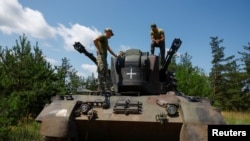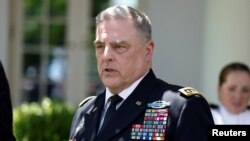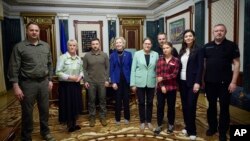Latest developments:
- The United States is confident Ukraine’s counteroffensive against Russia is making progress despite the lack of any significant break in the Russian lines. Joint Chiefs Chairman General Mark Milley told an audience in Washington on Friday that the slow pace of Ukraine’s advance was “part of the nature of war.”
- Milley also said the U.S. was openly considering providing Ukraine with cluster munitions, long-range Army Tactical Missile System (ATACMS) missiles and even some of its own F-16 fighter jets. "These things are on the table,” he said. “There's no decision at this point.”
- The U.N. expressed concern Friday that no new ships have been registered since June 26 under a deal allowing the safe Black Sea export of grain from Ukraine. "We call on the parties to commit to the continuation and effective implementation of the agreement without further delay," U.N. spokesperson Farhan Haq told reporters.
- Russian President Vladimir Putin spoke by phone with Indian Prime Minister Narendra Modi on Friday. Moscow said Modi expressed support for what the Kremlin called the Russian leadership's decisive actions in handling the mutiny by the Wagner mercenary group last Saturday. The call came after the U.S. and India declared themselves "among the closest partners in the world" last week during a state visit to Washington by Modi. India has yet to condemn ally Russia for the invasion of Ukraine.
- Russian forces hit a school in Serhiivka, Donetsk oblast, on Friday, killing two staff members and injuring six others, the regional prosecutor's office reported.
-----
The failure of Ukraine’s counteroffensive against Russian troops to make rapid advancements is not causing any panic among top U.S. military officials.
Ukrainian officials have expressed frustration in recent days, calling on Washington and the West to provide it with more advanced weaponry to help dent Russian defensive positions and allow Ukrainian troops to retake more territory.
But U.S. officials remain confident Ukraine’s counteroffensive will make headway, even if it takes six to eight weeks before Ukrainian forces see more substantial gains.
"War on paper and real war are different,” the top U.S. military commander, Joint Chiefs Chairman General Mark Milley, told an audience in Washington on Friday.
"That it's going slower than people predicted doesn't surprise me at all," Milley said at the National Press Club, noting Ukrainian forces were “advancing, steadily, deliberately."
“It’s going to be very difficult. It’s going to be very long. And it’s going to be very, very bloody, and no one should have any illusions about any of that,” he said.
Earlier Friday, Ukraine’s top general told The Washington Post his forces desperately needed ammunition and other advanced weaponry.
It “pisses me off,” said Valery Zaluzhny, commander in chief of Ukraine's armed forces. “This is not a show. … It's not a show the whole world is watching and betting on or anything. Every day, every meter is given by blood.”
“Without being fully supplied, these plans are not feasible at all,” he added, criticizing the West for pushing war plans that rely on air superiority, which neither Ukraine nor Russia has been able to establish.
More weapons sought
Zaluzhny and other Ukrainian officials have repeatedly called on the U.S. and its other allies to provide not just tanks and armored vehicles, but cluster munitions, long-range missiles and modern fighter jets, like F-16s.
So far, the U.S. has been hesitant to provide Kyiv with such systems, although it has said it will allow its allies to provide Ukraine with the U.S.-made jets and is training its pilots to fly them. Washington says the focus has been on giving Ukraine systems and weapons it can immediately deploy to the front lines.
Milley said Kyiv’s requests were not being ignored.
"ATACMS, F-16s or anything else is in a constant review process," he said. "These things are on the table. There's no decision at this point."
Milley said the U.S. had also not ruled out providing Ukraine with cluster munitions, despite concerns by some allies about the nature of the bombs.
The munitions, which open up in midair and drop bomblets, are opposed by a number of humanitarian groups, which say they have a high rate of failure and often lead to civilian casualties.
Ukrainian Defense Minister Oleksii Reznikov has said Kyiv’s forces have successfully liberated nine settlements in Donetsk and Zaporizhzhia oblasts, though the main attack is yet to come.
Northern border
Ukrainian President Volodymyr Zelenskyy has asked his senior military leadership to strengthen Ukraine’s northern military sector after the arrival in Belarus of Russian mercenary leader Yevgeny Prigozhin.
"The decision … is for Commander in Chief Zaluzhny and 'North' commander [General Serhiy] Naev to implement a set of measures to strengthen this direction," Zelenskyy said on the Telegram messaging app.
Zelenskyy did not mention Wagner Group boss Prigozhin in the brief post on Telegram.
National Security Council spokesman John Kirby told VOA the U.S. would “continue to monitor Wagner's activities wherever they are around the world, and we're going to continue to hold them properly accountable for the kinds of egregious violent, deadly and illegal conduct ... that they are still capable of conducting.”
After pushing Russian forces out of northern regions last year, Ukraine took steps to tighten the defense of its border with Belarus, a close ally of Russia.
Prigozhin flew from Russia into exile in Belarus on Tuesday under a deal negotiated by President Alexander Lukashenko that ended his mercenaries' mutiny in Russia on Saturday.
Thunberg’s involvement
Zelenskyy met Thursday in Kyiv with Swedish environmental activist Greta Thunberg and prominent European figures who are forming a working group to assess ecological damage from the 16-month-old Russian invasion. Their talks focused on the destruction of the Kakhovka hydroelectric power plant.
“Combating ecocide is one of the points of the Ukrainian Peace Formula, and we must implement each of its points, all aspects of peace,” said Zelenskyy.
Zelenskyy also met Thursday with former U.S. Vice President Mike Pence, who made a surprise visit in Kyiv. Zelenskyy thanked Pence for his support. "We appreciate that both major U.S. parties, the Republican and Democratic, remain united in their support for Ukraine,” he said, adding that “we feel the strong support of the people of the United States.”
Zelenskyy also thanked the U.S. for the recent defense assistance packages worth $2.1 billion and $500 million, allocated on June 6 and June 27, respectively, and he emphasized the unprecedented total amount of support provided, which has reached $43.1 billion since February last year.
Pence was the first Republican U.S. presidential candidate to meet with the Ukrainian president during the campaign.
VOA White House Bureau Chief Patsy Widakuswara contributed to this report. Some information came from The Associated Press, Agence France-Presse and Reuters.







